You should change the oil in your lawn mower at least every year (more if you are mowing commercially) but I bet many people do not change it. If you maintain your mower it should last a long time. The reason you don’t change your mower’s oil should not be that it’s too difficult because it is easy, it’s cheap, and I’ll walk you through it. Some push mowers are 2-cycle and require a gas-oil mixture for their fuel and those mowers do not need their oil changed because the oil is in the fuel. But, if your mower has a dip stick, then you will need to change the oil. It’s not solely because the oil is dirty, but oil breaks down over time and looses its ability to provide the viscosity necessary to lubricate the pistons and other internal parts in the mower’s motor. This tutorial should be applicable on most lawn mowers and the only big difference would be the location of the drain plug.
How to Change the Oil on Troy-Built 21″ Mulching Lawn Mower
Hardware:
Tools Needed:
- 3/8″ socket ratchet

or 3/8″ breaking bar (anything that you could put a 3/8″ socket on)
- 3/8″ socket extension

- Funnel

(may not be necessary but makes it easier)
- Container to catch the used oil (I used an empty 1/2 gallon carton)
- 5-gallon bucket or milk crate (or some other sturdy object that you can prop up the mower on)
Parts Needed:
Step 1: Determine the motor model on your mower.
If you want to know the oil capacity of your mower and the oil type you can find out by determining the model number and looking it up online. In my case on the
Briggs and Stratton website. Knowing the oil capacity is not critical but it makes filling up the oil easier since you know how much to put in. I was able to determine the motor model by looking on the metal plate above the muffler:
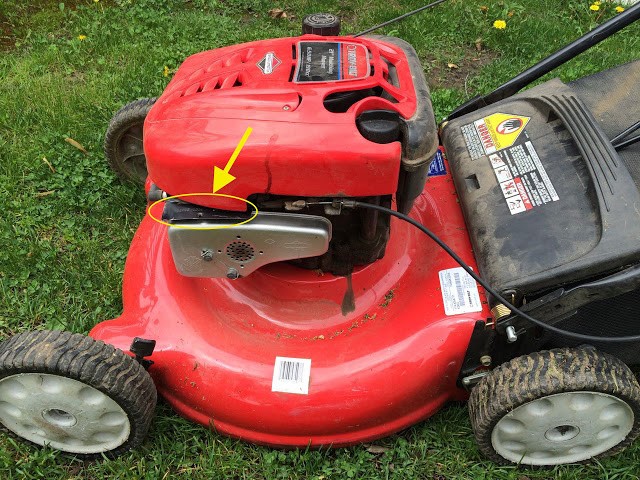 |
| Briggs and Stratton Motor model number location on this Troy-Built 21″ Mulching Mower |
Now-a-days mowers have all kind of plastic covers to make them look cooler (makes the engine run hotter though) and in my case I needed to push the red plastic cover out of the way to see the full model number:
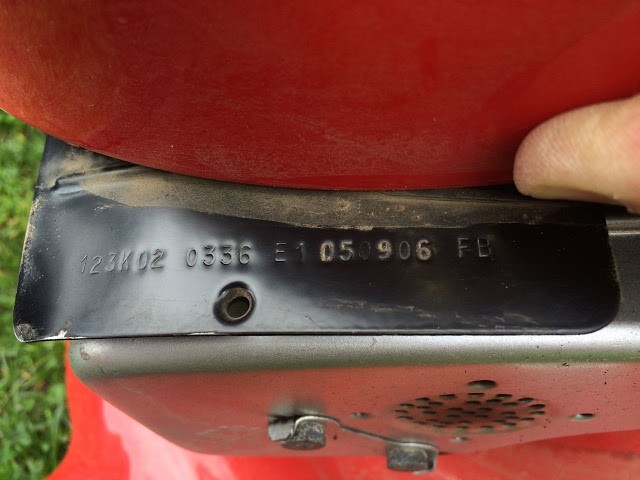 |
| Briggs and Stratton Model Number for my Troy-Built Push Mower |
After looking up that motor I learned that this model motor takes 18-20 oz (0.54-0.59 L) of SAE-30 oil. You can pick up a quart at your local hardware or auto parts store or use my link above in the “Parts” list. SAE-30 oil is a fixed viscosity oil and that is just fine since you will be running your mower only in the summer (versus your car which needs a multi-viscosity oil so it can use the same oil in conditions of 100 degrees F to -20 degrees F). Once you have your oil you can move to the next step and get started changing your mower’s oil.
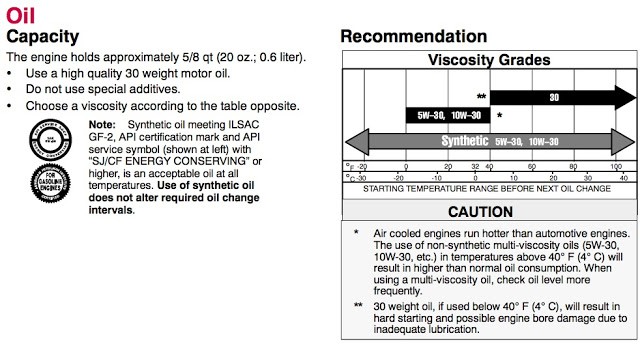 |
| Oil type and capacity for Briggs and Stratton Model 123K02-0336-E1 |
Step 2: Locate the drain plug of your mower.
My mower’s drain plug is located on the underneath side of the mower, below the deck, down by where the blades are:
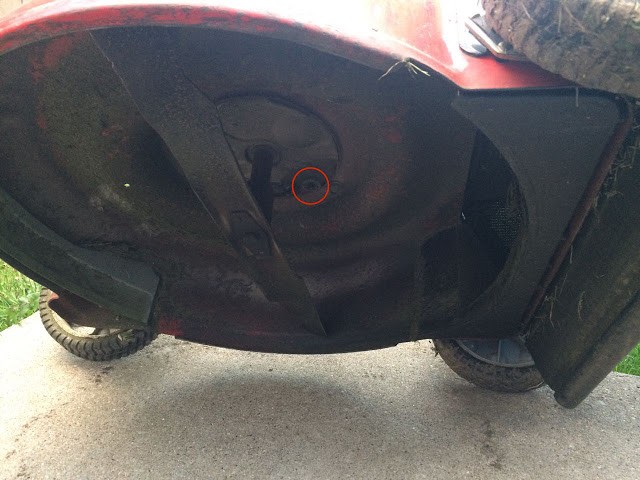 |
| Troy-Built 21″ Mulching Mower Oil Plug Location (click on the image to see a full size version) |
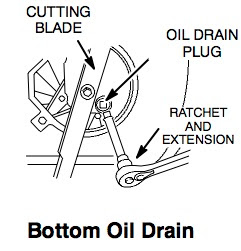 |
| Oil Plug Diagram |
The drain plug on this mower has a 3/8″ square hole in it, which is the same size as the nub on a socket wrench without a socket on it. An alternate location for the drain plug is on the side of the engine as seen in this version of the same Briggs and Stratton engine:
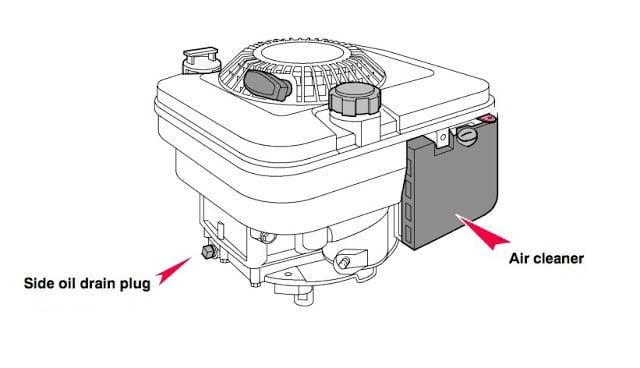 |
| Alternative drain plug location–on the side |
The down-side of having a side drain plug is that it’s hard not to get a deck full of oil when you drain it. If you do have a side drain plug be aware that your gas tank may leak if it’s full and you just tip your mower up on its side so the oil drains straight down into your bucket. Here is a diagram of different types of drain plugs you will come across:
 |
| Oil Drain Plug Types |
Step 3: Prop up your mower.
It’s just a lot easier to do this if you have it propped up on something. I don’t suggest just laying it completely on the side because often the gas tank will leak. After doing this repair I was reading the manual (yes, after the repair) and learned that Briggs and Stratton suggests that if you are going to tip the motor on one side that you should tip it with the spark plug up:
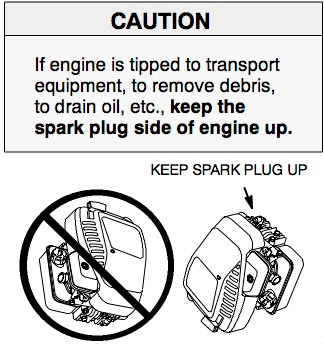 |
| Briggs and Stratton suggests tipping with the spark plug up |
In my case this would be leaning the mower back by pushing the handle down towards the ground. I didn’t tip my mower that much so it did not really matter. The reason you could experience the gas tank leaking when you tip the mower is that the gas cap has a hole in it, to allow the tank to draw in air as the fuel is consumed so a vacuum doesn’t develop in the tank. I used a 5-gallon bucket this time but I’ve used a piece of 4×4 post in the past. You could also use a milk crate. I tried not to tip the mower any more than necessary and because I was able to get low by going down my basement stairs I didn’t need to tip it too much:
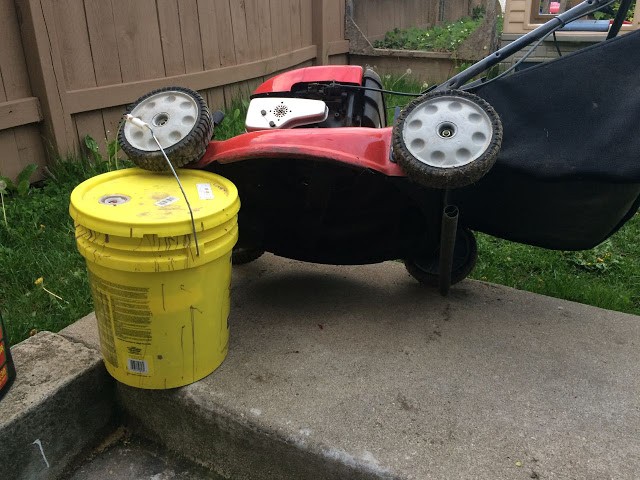 |
| Propping up the mower for the oil change |
Step 4: Place a bucket under the drain plug to catch the oil.
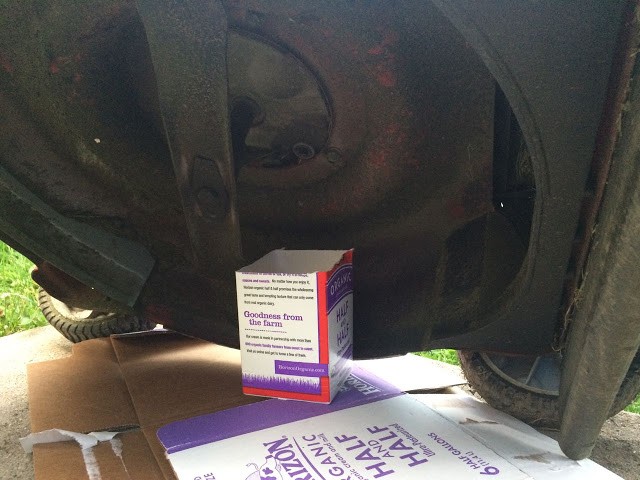 |
| I used a 1/2 gallon milk carton to catch the oil |
Step 5: Remove the oil plug.
Loosen and remove the oil plug with your socket wrench and hang on to the oil plug or it will drop in your bucket. Loosen the bolt by turning it counter-clockwise. I actually used a breaker bar but a socket will work the same.
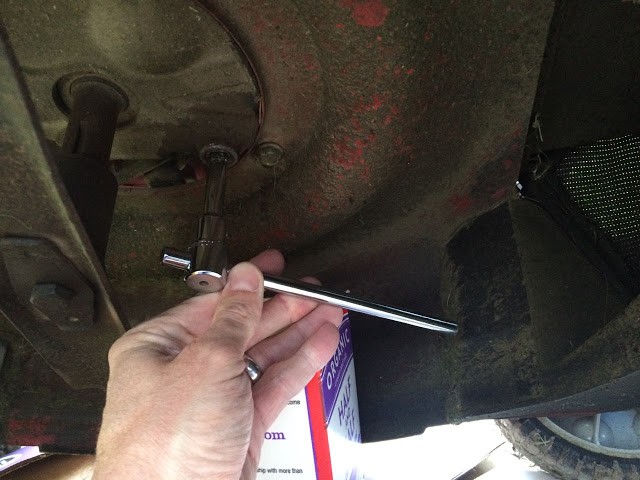 |
| Loosening the oil drain plug on a Troy-Built Mower |
I always save the last quarter of a turn to do by hand so I can hold on to the plug:
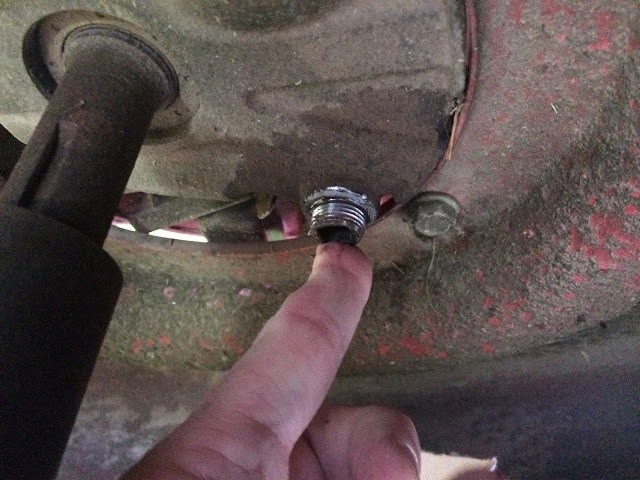 |
| Here the oil is beginning to leak |
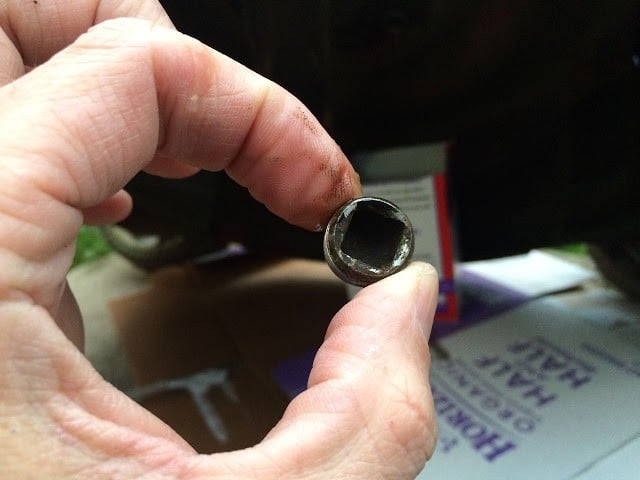 |
| The drain plug removed |
Step 6: Let the oil drain out.
As you can see, my oil wasn’t that dark because I only mowed a dozen or so times and it’s not that dusty in my yard but it is still a year old so for that reason it still should be changed.
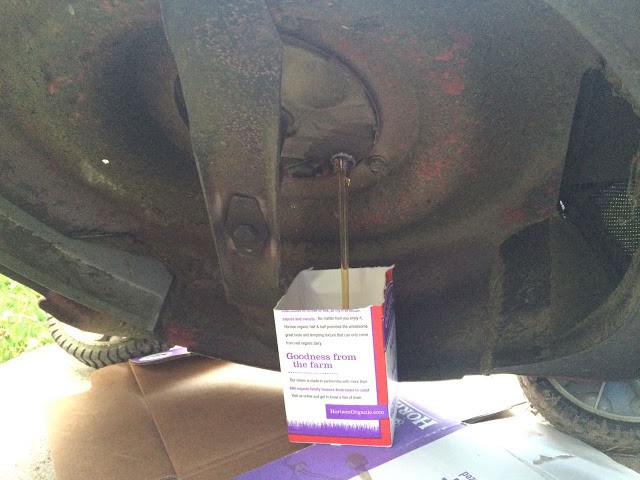 |
| Draining the oil |
I would remove the dipstick at this point to allow air to draw in as the oil drains out so you change as much of the oil out as possible (sorry for my crooked picture):
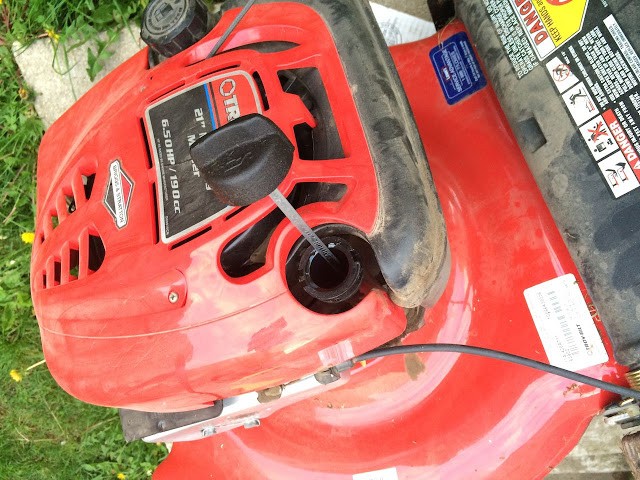 |
| Remove the dipstick to help all the oil to drain out |
Step 7: Reinstall the drain plug.
Once the oil all runs out and stops dripping too much put the oil plug back in. Important: Make sure to start the drain plug out by hand to make sure you do not strip the threads. Then tighten it up with your ratchet.
Step 8: Fill the engine with oil.
Different mowers have different engines on them and even the same model of mower may have a couple of motors, depending on when it was produced. From Step 1 I know I have a Briggs and Stratton Model 123K02-0336-E1 190cc, 6.5 HP motor on my mower:
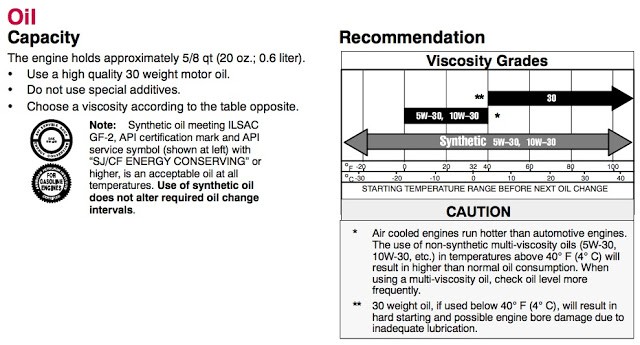 |
| Briggs and Stratton Model 120000 Engine Oil Specifications and Capacity |
I like to measure out the oil I need to put in the mower just so I don’t have to “check the dipstick” so many times. I know this mower takes .6 liters of oil, which is 600 mL. A Quart is 946 mL. If I put just the right amount in, I will have 946 mL – 600 mL = 346 mL, or approximately 350 mL left in the bottle.
 |
| Calculating how much oil will be left in the bottle when I’ve poured the correct amount into the engine |
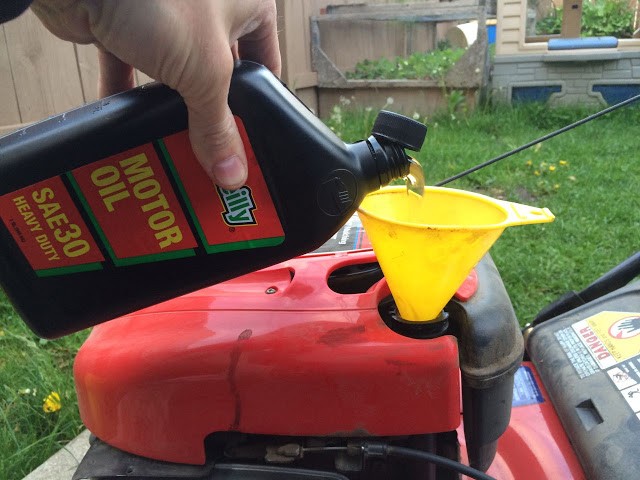 |
| Filling the engine up with oil |
Here I can see that I need to put about 100 mL more into the engine:
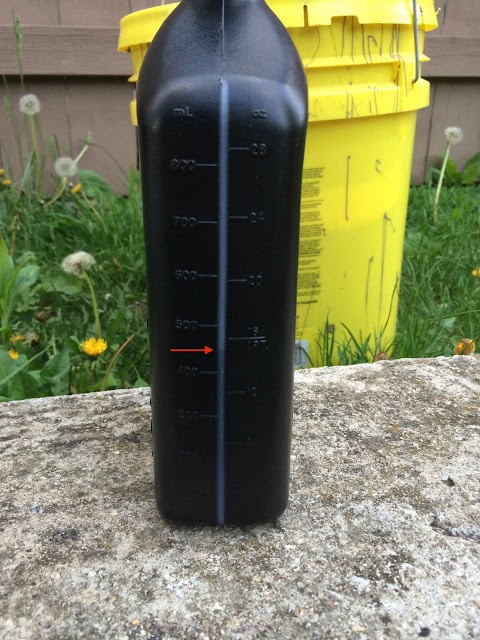 |
| I still need to add 100 mL |
Step 9: Reinstall the dipstick and check the oil.
You should reinstall the dipstick and lock into place and then, with the mower on a level surface, remove the dipstick to get a good read on the oil level. When the oil is fresh it is difficult to see on the dipstick so sometimes I lay it on a paper towel to make it easier to see:
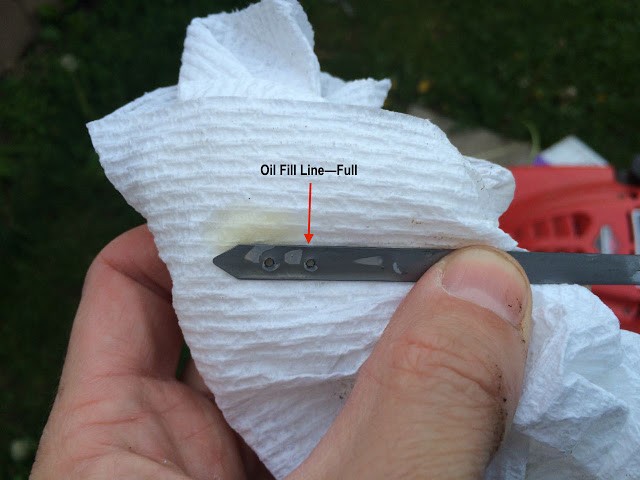 |
| Using a paper towel to check the (fresh) oil level |
You can see above that the oil is up to the second hole from the end of the dipstick, which is the “full” mark–perfect. Put the dipstick back in and lock it in place with the cap. Mine has two notches on one side and one on the other so it will only start on in one spot. Now you’ve extended the life of your mower and are ready to mow.
Other Helpful Links:
Amazon Associate Disclosure: As an Amazon Associate I earn from qualifying purchases. This means if you click on an affiliate link and purchase the item, I will receive an affiliate commission. The price of the item is the same whether it is an affiliate link or not. Regardless, I only recommend products or services I believe will add value to Share Your Repair readers. By using the affiliate links, you are helping support Share Your Repair, and I genuinely appreciate your support.
Related
)





















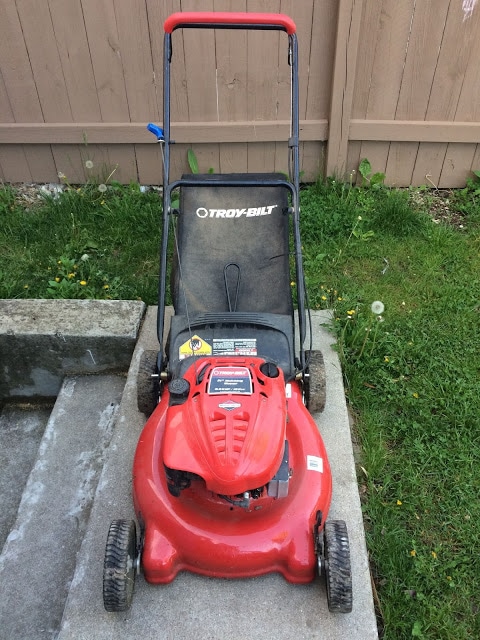
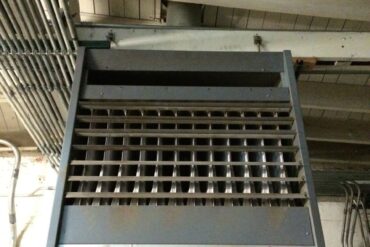
Very helpful. I’ve had this same mower for over 10 yrs and still running strong.
Good to hear Ron, hopefully this was not the first oil change in those ten years!!
Thanks John.I have the same mower.Still starts on one pull.